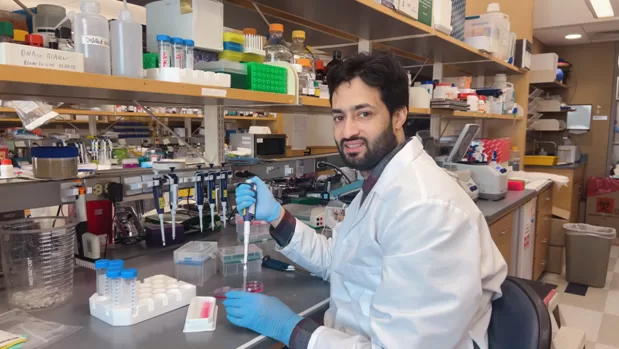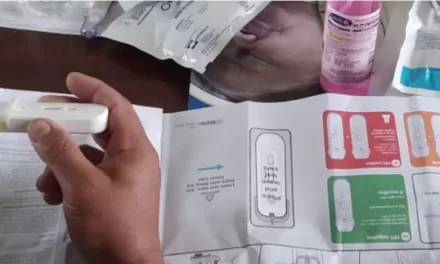BOSTON, USA / SRINAGAR, INDIA – In a significant stride forward for cancer research, Kashmir-born scientist Dr. Shahid Banday and his colleagues at the Howard Hughes Medical Institute (HHMI) Lab, UMass Chan Medical School, have identified a potential new treatment pathway for Ewing Sarcoma (ES), a rare and aggressive cancer primarily affecting children and young adults. Their groundbreaking study, published in Springer Nature Communications, reveals that an existing FDA-approved drug shows remarkable promise in targeting the mechanisms driving this devastating disease.
Ewing Sarcoma arises from a specific genetic mutation leading to the formation of an oncogenic fusion protein, most commonly EWS-FLI1. This protein is crucial for the tumor’s survival and progression. However, targeting EWS-FLI1 directly has proven extremely difficult.
“Transcription factors [like EWS-FLI1] are notoriously difficult to target,” explained Dr. Banday. “Typically, proteins have a distinct pocket where drugs can bind… However, this transcription factor lacks such a pocket.”
Faced with this challenge, Dr. Banday’s team shifted focus from targeting the protein itself to disrupting the mechanisms responsible for its formation. “Since this protein is not present in normal cells, targeting its formation could provide a therapeutic target for cancer treatment,” he reasoned.
Using a sophisticated genetic CRISPR screen, the researchers searched for factors essential for the expression of the EWS-FLI1 protein, aiming to find more “druggable” targets. This innovative approach led them to identify a protein called C1GALT1 as crucial for EWS-FLI1 expression.
Remarkably, the team also identified a known, potent small molecule inhibitor of C1GALT1: Itraconazole (ITZ). Itraconazole is an antifungal medication first approved by the US FDA nearly three decades ago, known for its safety and non-toxicity.
Pre-clinical studies yielded highly encouraging results. Treating human Ewing Sarcoma cells with ITZ in the lab significantly reduced EWS-FLI1 levels and effectively killed the cancer cells, while leaving healthy cells unharmed. Even more significantly, in mouse models, ITZ treatment not only stopped the growth of Ewing Sarcoma tumors but also caused them to shrink or regress.
“These findings are highly promising,” stated the research team. Dr. Banday and his collaborators have filed US and international patents for the use of ITZ as an ES treatment. They are now actively working with sarcoma experts like Dr. Mathew Hamming and other research groups across the US to explore pathways for advancing ITZ into clinical trials for Ewing Sarcoma patients.
The Promise of Drug Repurposing
This discovery highlights the power of drug repurposing – finding new uses for existing, approved medications. As Dr. Banday notes, developing entirely new drugs is a lengthy and expensive process, often taking over a decade. Repurposing drugs with established safety profiles, like ITZ, can significantly accelerate the journey from lab discovery to patient treatment.
Dr. Banday’s lab utilizes techniques like broad profiling and functional genomics to understand cancer mechanisms and identify potential small molecule treatments. His previous work has identified potential therapies for ovarian cancer, blood cancer, and the genetic disorder Friedreich’s Ataxia.
The Urgent Need for Sarcoma Research
Sarcomas, though rare (about 1% of adult cancers), encompass over 100 subtypes and remain poorly understood. Many lack effective treatments, leading to low survival rates. In 2024, the US anticipates roughly 13,590 new soft tissue sarcoma cases and 5,200 deaths.
In India, while reported sarcoma incidence is lower, this may reflect diagnostic limitations rather than true prevalence. Data indicates a rising trend of Ewing Sarcoma in major Indian cities. However, focused research on ES within the Indian population is lacking, hindering the development of region-specific detection and treatment strategies.
Dr. Banday also highlighted the high prevalence of gastrointestinal (GIST) carcinoma in his native Kashmir, potentially linked to dietary habits, genetics, and environmental factors, often diagnosed late due to limited screening. This underscores the need for targeted research into specific cancer burdens within different populations.
The potential repurposing of Itraconazole offers a beacon of hope for Ewing Sarcoma patients and underscores the critical importance of continued, innovative research into rare cancers worldwide.
Disclaimer: This news article is based on the provided research information and is intended for informational purposes only. It does not constitute medical advice. Patients and their families should consult with qualified healthcare professionals for diagnosis, treatment options, and any health-related concerns. Decisions regarding medical care should be made in consultation with a physician.












